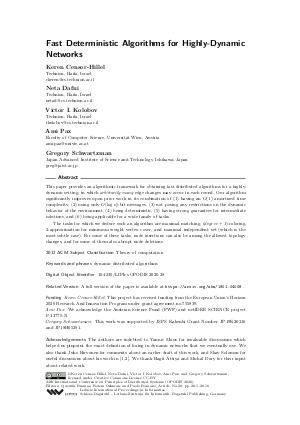@InProceedings{censorhillel_et_al:LIPIcs.OPODIS.2020.28,
author = {Censor-Hillel, Keren and Dafni, Neta and Kolobov, Victor I. and Paz, Ami and Schwartzman, Gregory},
title = {{Fast Deterministic Algorithms for Highly-Dynamic Networks}},
booktitle = {24th International Conference on Principles of Distributed Systems (OPODIS 2020)},
pages = {28:1--28:16},
series = {Leibniz International Proceedings in Informatics (LIPIcs)},
ISBN = {978-3-95977-176-4},
ISSN = {1868-8969},
year = {2021},
volume = {184},
editor = {Bramas, Quentin and Oshman, Rotem and Romano, Paolo},
publisher = {Schloss Dagstuhl -- Leibniz-Zentrum f{\"u}r Informatik},
address = {Dagstuhl, Germany},
URL = {https://drops.dagstuhl.de/entities/document/10.4230/LIPIcs.OPODIS.2020.28},
URN = {urn:nbn:de:0030-drops-135138},
doi = {10.4230/LIPIcs.OPODIS.2020.28},
annote = {Keywords: dynamic distributed algorithms}
}

 Creative Commons Attribution 3.0 Unported license
Creative Commons Attribution 3.0 Unported license

































